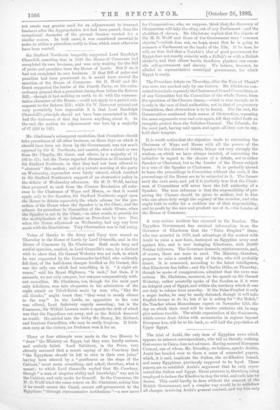Votes of thanks to the Army and Navy were moved
on Thursday in the House of Lords by Lord Granville, and in the House of Commons by Mr. Gladstone. Both made long and cordial speeches, marked, in Lord Granville's case, by a distinct wish to show that Sir Garnet Wolseley was not rash, in which he was supported by the Commander-in-Chief, who evidently felt that, of the half-dozen charges levelled at Sir Garnet, this was the only one which had something in it. "A night ad- vance," said his Royal Highness, "is rash ;" but then, if it succeeds, we not only conquer, but conquer comparatively with- out casualties. Mr. Gladstone, too, though for the most part only felicitous, rose into eloquence in his admiration of the night attack on Tel-el-Kebir made by men who, "like the old Greeks," might boast that "they went in manly silence to the war." In the Lords, no opposition to the vote was offered, Lord Salisbury eagerly assenting; but in the Commons, Sir Wilfrid Lawson made a speech the drift of which was that the Egyptians ran away, and so the British deserved no credit. He carried into the lobby Mr. Storey, Mr. Richard, and fourteen Parnellites, who may be easily forgiven. If Irish- men carp at the victory, an Irishman won it for us.


































 Previous page
Previous page